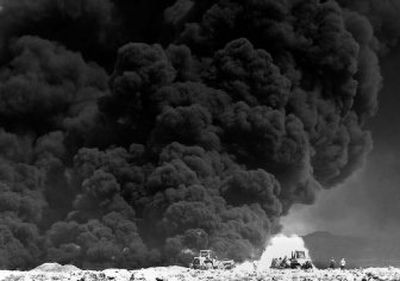Bombing targets Iraq funeral

BAGHDAD – The friends and family of slain Fallujah tribal leader Alawi Ahmed Zuwaid decided to ignore a threatening leaflet and honor him Thursday with a public funeral. In return, the mourners were hit with the most deadly bombing of the day in Iraq.
As the funeral procession moved through Fallujah, a suicide car bomber attacked the mourners, killing 30 people and injuring 34 others, authorities said. They were among at least 67 Iraqis killed or found dead Thursday.
The U.S. military also announced that two soldiers were killed Wednesday in Al Anbar province while conducting combat operations. The deaths raise the total number of American soldiers killed in the war to 3,434, according to icasualties.org.
Al-Qaida in Iraq apparently had zeroed in on Zuwaid, a 60-year-old restaurant owner, for cooperating with American forces in reconstruction projects, friends said. He had also helped to form an alliance among other leaders against al-Qaida.
On Wednesday, militants shot him dead as he arrived at his house from prayers, police said.
Elsewhere, U.S. and Iraqi forces stepped up their search for the two remaining missing soldiers south of Baghdad, while Prime Minister Nouri al-Maliki announced a slate of Cabinet ministers to replace those pulled out by radical Shiite cleric Muqtada al-Sadr.
“A significant effort continues to be under way to find (the missing soldiers),” U.S. Army Lt. Col. Randy Martin said.
The nearly two-week search, Martin said, involved 4,000 American soldiers and 2,000 Iraqi soldiers, who have questioned about 1,100 people, dropped 320,000 leaflets and covered 260 square miles.
In the process, the joint forces discovered significant caches of weapons used by snipers and bombers, and they killed a team of snipers who attacked them, Martin said.
The body of Pfc. Joseph J. Anzack Jr., of Torrance, Calif. was found Wednesday floating down the Euphrates River 12 miles south of the site where he and two other soldiers were captured by insurgents nearly two weeks ago. Yet to be found are Spc. Alex R. Jimenez, 25, of Lawrence, Mass., and Pvt. Byron W. Fouty, 19, of Waterford, Mich.
In other violence in the capital, militants set up a checkpoint in an eastern district, stopped a minibus and killed 11 people on board. The gunmen then loaded the bus with explosives, which detonated when police and security forces arrived, killing two more civilians and injuring four others.
In central Baghdad, a suicide bomber drove his car into an army checkpoint, killing a soldier and injuring two civilians.
In the northwestern part of the city, a high-ranking official in the Ministry of Public works and Social Affairs, Salim Hameed Hassan, was slain by unidentified gunmen riding in two cars.
Twenty-two unidentified bodies were found dumped throughout the city, apparent victims of sectarian death squads.
Al-Maliki’s slate of new Cabinet members was not received well and appeared unlikely to quell sectarian tensions.
The Cabinet members had resigned April 16, at al-Sadr’s request, in a dispute over al-Maliki’s refusal to set a timetable for U.S. withdrawal.
Waleed Kremawi, an official in al-Sadr’s political office, said al-Maliki’s slate was unacceptable and charged that some had allegations of corruption in their past. He declined to provide details, and al-Maliki insisted his nominees had clean records.
Kremawi said that the parliamentary bloc allied with al-Sadr would likely block al-Maliki’s slate, and the cleric’s political office was considering alternative candidates.